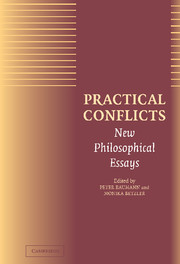Book contents
- Frontmatter
- Contents
- Foreword
- 1 Introduction: Varieties of Practical Conflict and the Scope of Practical Reason
- 2 Willing the Law
- 3 The Myth of Egoism
- 4 Thinking about Conflicts of Desire
- 5 Putting Together Morality and Well-Being
- 6 The Second Worst in Practical Conflict
- 7 Personal Practical Conflicts
- 8 Sources of Practical Conflicts and Reasons for Regret
- 9 Conflicting Values and Conflicting Virtues
- 10 Involvement and Detachment: A Paradox of Practical Reason
- 11 Outcomes of Internal Conflicts in the Sphere of Akrasia and Self-Control
- 12 Are There Insolvable Moral Conflicts?
- 13 Moral Dilemmas of Transitional Justice
- 14 Do Conflicts Make Us Free?
- List of Contributors
- Name Index
- Subject Index
- References
4 - Thinking about Conflicts of Desire
Published online by Cambridge University Press: 02 December 2009
- Frontmatter
- Contents
- Foreword
- 1 Introduction: Varieties of Practical Conflict and the Scope of Practical Reason
- 2 Willing the Law
- 3 The Myth of Egoism
- 4 Thinking about Conflicts of Desire
- 5 Putting Together Morality and Well-Being
- 6 The Second Worst in Practical Conflict
- 7 Personal Practical Conflicts
- 8 Sources of Practical Conflicts and Reasons for Regret
- 9 Conflicting Values and Conflicting Virtues
- 10 Involvement and Detachment: A Paradox of Practical Reason
- 11 Outcomes of Internal Conflicts in the Sphere of Akrasia and Self-Control
- 12 Are There Insolvable Moral Conflicts?
- 13 Moral Dilemmas of Transitional Justice
- 14 Do Conflicts Make Us Free?
- List of Contributors
- Name Index
- Subject Index
- References
Summary
Nothing is more familiar: One wants one thing and wants another, but cannot have both. The problem also has a less objectual, more behavioral guise, as when one wants to do one thing, do another, and cannot do both. Most generally, perhaps, we may mark out a propositional form of desire conflict: One desires that p, desires that q, and recognizes that both propositions cannot obtain. In whichever form, desire conflicts pervade our daily lives. That is not in itself a big deal: To say this is hardly to side, yet, with Isaiah Berlin on conflicts of Values. Whatever he meant by clashing Values, he presumably did not have in mind that between a sensible family station wagon and a sporty two-seater, nor that between attending the department meeting and watching one's child play soccer, nor yet that between one's sister hosting one for the holidays and one's brother doing so. I want to focus on the conflicts of desire that are pedestrian and pervasive, rather than the ones that are portentous and potentially problematic. While the latter are important for ethics and value theory, even the simpler, more basic conflicts put our understanding of desire under significant pressure.
In addition to facing conflicts of desire daily, we also constantly deliberate about how to resolve them. That is not to say that it is easy: We may feel torn about what sort of car to buy, about how to juggle professional and familial responsibilities, or about the best way to plan our holidays.
Information
- Type
- Chapter
- Information
- Practical ConflictsNew Philosophical Essays, pp. 92 - 117Publisher: Cambridge University PressPrint publication year: 2004
References
Accessibility standard: Unknown
Why this information is here
This section outlines the accessibility features of this content - including support for screen readers, full keyboard navigation and high-contrast display options. This may not be relevant for you.Accessibility Information
- 2
- Cited by
